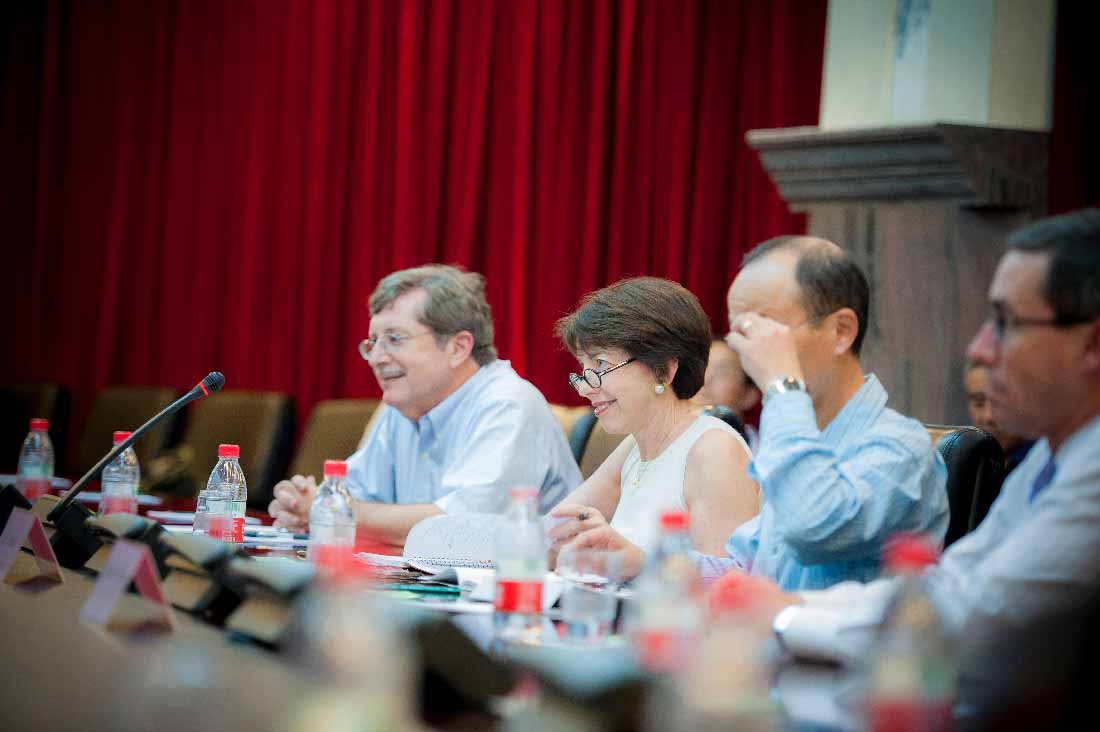By:
- Anthony King
Published Date
By:
- Anthony King
Share This:
Turning Point with China
UC San Diego, Asia Society offer policy recommendations to new administration for positive U.S.-China relationship

The iconic Shanghai skyline at night. Photos by Erik Jepsen/UC San Diego Publications
With the United States-China relationship in a precarious state, the new presidential administration must urgently reassess U.S. policy toward China, a group of prominent China specialists led by UC San Diego professor Susan Shirk conclude in a new report.
Convened by the 21st Century China Center at the UC San Diego School of Global Policy and Strategy and the New York-based Asia Society Center for U.S.-China Relations, the Task Force on U.S.-China Policy provides high-level policymakers in the United States with a set of concrete recommendations for navigating future U.S.-China relations.
“We are at a critical moment for our two countries, a moment that calls for our government and the public to reassess and reexamine policy toward China,” Shirk said. “We are confident our recommendations will support a stable relationship that is in American interests and help the U.S. maintain an active, positive presence in the Asia-Pacific.”
The task force, co-chaired by Shirk and Orville Schell, director of the Center on U.S.-China Relations and former dean at UC Berkeley, includes former government officials, scholars and think-tank researchers, many of whom have served under both political parties and every U.S. president since Richard Nixon.

Susan Shirk, center, with School of Global Policy and Strategy colleagues.
“The people who came together to work diligently on this report — from all areas of professional expertise in U.S.-China relations — represent some of the top thinkers on this pressing subject. Not just thinkers, but ‘doers.’ Individuals who have devoted their careers to making progress on one of the world’s most important relationships,” Shirk said.
The task force report says contentious issues such as regional maritime disputes, trade and investment practices, human rights, and cyberespionage risk undermining the overall relationship, despite cooperative successes in areas such as climate change and nuclear proliferation in Iran.
The administration’s challenge is to formulate “a revised U.S. strategy that addresses these growing concerns about China’s actions without unduly damaging the benefits the U.S. stands to gain from cooperating in areas where interests still converge,” the report says.
In its first year, the administration will confront six high-priority issues in U.S.-China policy, the task force co-authors state. Insufficient attention or missteps in dealing with these issues could undermine the foundations of the broader relationship as well as the position of the U.S. in Asia and the global order.
These six urgent priorities are to:
- Work with China to halt North Korea’s nuclear and missile program,
- Reaffirm U.S. commitments to Asia,
- Deploy effective tools to address the lack of reciprocity in U.S. trade and investment relations with China,
- Intensify efforts to encourage a principled, rules-based approach to the management and settlement of Asia-Pacific maritime disputes,
- Seek an easing of Chinese human rights and civil society policies that harm U.S. organizations and undermine public support for better U.S.-China relations, and
- Sustain and broaden U.S.-China collaboration on global climate change.
The report also presents analysis and recommendations on 10 broader, long-term issues in the U.S.-China relationship, including cyber issues, energy and climate change, Taiwan and Hong Kong, human rights, defense and military relations, and trade and investment relations.
“We wrote the report being mindful of past lessons,” Shirk said. “For instance, we think this is particularly important when making recommendations regarding Taiwan. The ‘One China Policy’ has served as the foundation for our relationship with China for decades and has helped protect Taiwan’s, as well as the entire region’s, peace. It serves no country’s interests to abandon it now.”

“We are confident our recommendations will support a stable relationship,” Shirk said.
Members of the task force have met with and briefed senior officials from the administration and congress on the findings. Shirk said she feels positive administration officials were eager to listen to their recommendations, and is hopeful that the new administration will act with both prudence and resolve in pursuing a mutually beneficial relationship between the U.S. and China.
Following report release events in Washington and New York City, the 21st Century China Center will host a public discussion of the report findings and the reception they received from the administration and congress on Monday, Feb. 13 at UC San Diego. Shirk, Schell and additional report author Winston Lord, a former U.S. ambassador to China and Assistant Secretary of State, will speak at the Faculty Club beginning at 4 p.m. The community event will be recorded for broadcast at a later date by University of California Television.
The report was made possible by a grant from the Carnegie Corporation of New York, with additional support from The Annenberg Retreat at Sunnylands, Henry Luce Foundation and additional philanthropic donors.
Share This:
Stay in the Know
Keep up with all the latest from UC San Diego. Subscribe to the newsletter today.



